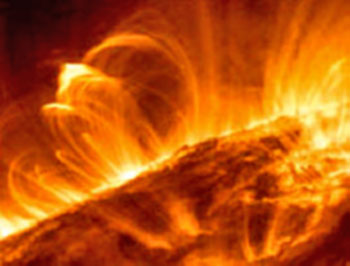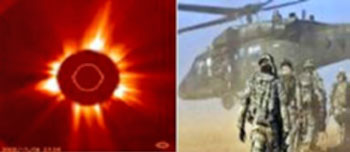|

by Buryl Payne
2008
from
World-Mysteries Website
|
Buryl Payne has a
Ph.D. in psychology and an M.S. in physics and has
written several books and articles on a variety of
topics. He is currently working on a book exploring
fifth dimensional consciousness. |
"I believe it will be the
magnetic influence produced by the Sun which will usher
in what is described by our ancient ancestors as "the
transition" bringing us to a new state-of-being".
Mitch Battros
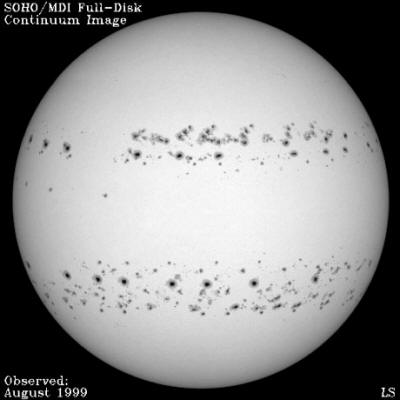
Credit: Louis Strous
(LMSAL), SOHO - MDI Consortium, ESA, NASA
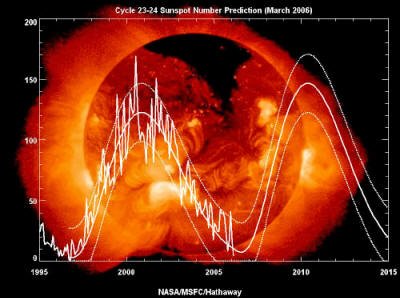
Solar Cycle 23-24. Image: Courtesy of NASA
Solar Cycle 24 has begun - and it
has been predicted by NASA, NOAA and ESA to be up to 50% stronger
than its 'record breaking' predecessor Cycle 23 which produced the
largest solar flare ever recorded.
The Sun will reach its 'apex' (maximum)
in late 2011 into 2012.
We have tantalizing hints that the Earth's climate may be linked to
sunspots. The "Little
Ice Age" corresponded with a 70-year period, 1645-1715,
when sunspots were sparse in number, the
Maunder minimum.
Also, there are strong statistical
associations linking current trends in climate (surface
temperatures) to trends in solar activity, as outlined in another
paper by Wilson for the Journal of Geophysical Research
(Atmospheres).
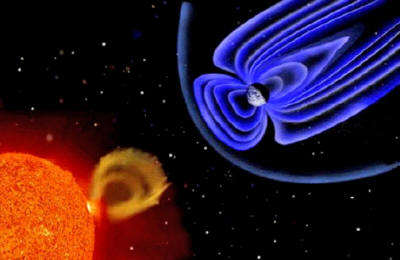
The magnetosphere
protects Earth against the relentless solar wind
(Image: NASA)
Scientific research along with ancient
text documents suggests the Mayan Calendar ending on
December 21st 2012 may very well be connected to solar
activity.
Mitch Battros' research shows
that charged particles emitted by the Sun in the way of solar
flares, CME's and coronal holes are the cause of extreme earth
changes such as earthquakes, volcanoes, hurricanes, and tornadoes.
His research also indicates the very same magnetic flux which
effects the Earth, will also affect humans.
In fact, Battros will demonstrate how
the magnetic field which surrounds the Earth is similar to the
magnetic field which surrounds every living thing.
Could Cycles
of War or Peace Be Tied to Cycles of the Sun?
A growing number of scientists, health care professionals, and
concerned citizens argue that these invisible frequencies are
responsible for a host of various health problems.
Meanwhile, the largest polluter has gone
unnoticed: the Sun.
At certain times, the Sun's activity can
also aggravate mental health problems.
Every 10-11 years, the number of sunspots found on our closest star
rise from 0 (as it is currently in 2008) to a high of over 400.
While the sunspots themselves don't affect Earth, the solar flares
and other disturbances emanating from our Sun during increased
sunspot activity result in an increased number of particles
(electrons and protons) and harmful light radiation (ultraviolet and
x-rays), known as solar wind.
If it weren't for Earth's protective
magnetic field and atmosphere, this bombardment of particles would
burn us to a crisp.
Equation:
Sunspots => Solar Flares => Magnetic
Field Shift => Shifting Ocean and Jet Stream Currents => Extreme
Weather and Human Disruption
(mitch battros)
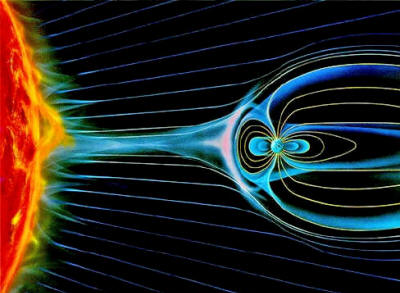
Fortunately, our planet's magnetic field
diverts most particles into a circular path around the Earth.
Like weather patterns found on Earth,
solar wind patterns can change rapidly. Luckily, our planet's
magnetosphere quickly responds to the threat and absorbs the impact,
wiggling and jiggling in the process.
Geophysicists call this
reaction a geomagnetic storm, but because of how it disrupts the
Earth's magnetic field, it could also be called electromagnetic
pollution.
These storms, although minute, affect brain waves and hormone
levels, causing a number of different reactions, predominately in
males.
While a few women may also experience changes during these
storms, they generally seem less affected by the Sun's behavior.
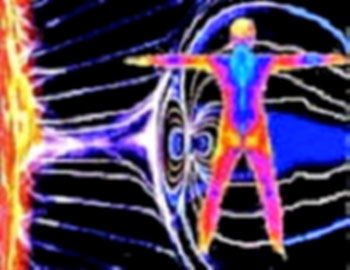
We too have magnetic
fields which surround each of us.
I think it is not
unrealistic to conjecture what is happening "externally" is
also happening "internally". I believe current science will
acknowledge this notion, showing the Sun's "charged
particles" and its influence on Earth's magnetic field is
the impetus of change. In-like, this same causal effect
occurs with human magnetic fields ushering in a change or
"transition".
Perhaps this is what
our
Mayan elders are trying to
tell us.
Reacting to changing hormone levels,
some men may become increasingly irritable and aggressive, while
others may instead become more creative.
An increase in solar activity is found
to increase psychotic episodes in individuals who already suffer
from unstable psychological states. While we might relate such
behavior to a full moon, in 1963, Dr. Robert Becker and his
colleague, Dr. Freedman, demonstrated that solar changes also
lead to a noticeable increase in psychotic activity.
Yet these reactions are not simply isolated to a few particularly
sensitive or unlucky individuals. Evidence indicates that wars and
international conflicts most often break out when sunspots are
rapidly forming or rapidly decaying, as these are times when there
are more intense geomagnetic storms.
In addition, this increase in solar activity also correlates to
periods of more accidents and illness, as well as an increase of
crimes and murders.
The entire biosphere is affected by this
electromagnetic pollution, and human behavior seems to react
accordingly.
Studies of how the Earth's
environment interacts with space and the solar wind are far more
than an academic exercise. They are important in shaping the
environment we enjoy today - and whether we enjoy it in the
dark.
The solar wind and space plasma storms induce massive electrical
currents that can affect power systems on the ground, especially
in the north. A large storm in 1989 induced currents in the
American northeast that caused a failure in the Hydro-Quebec
power system that deprived 6 million people of power for over 9
hours in Canada and the United States.
The same storm expanded the upper
atmosphere and increased drag on NASA's Long Duration
Exposure Facility (LDEF) satellite which carried valuable
specimens of materials in space exposure tests (NASA recovered
LDEF before it could re-enter the atmosphere).
Similar storms can set up currents that corrode the metal
structure of petroleum pipelines, disrupt satellite and
land-based communications, short-circuit satellite electronics,
and interfere with navigational systems on ships and aircraft.
We cannot stop geomagnetic storms, but we can understand them
and, eventually, predict what their effects may be in time to
take measures to protect valuable power grids, satellites,
aircraft, and other systems.
Source:
http://science.msfc.nasa.gov/newhome/headlines/plasma_plume/bullet6.htm
Storm Tracking
Thankfully, not all geomagnetic storms are disruptive. Some are
generally beneficial to humans.
But over time, these extremes in solar
activity may also affect periods of earthly conflict. The data on
cycles of war and peace extend back at least 2,500 years. (Some
believe that they may be traced even further, but the records are
not as reliable.)
Although some may argue that it seems as
if there is always war somewhere, records show that periods of
conflict increase and decrease in nearly regular cycles.
As early as 1915, some scientists were
beginning to recognize connections between solar activity and human
behavior. This work began with Russian scientist
Alexander Chizhevsky, who
observed that mass changes in human behavior correlated to sunspot
cycles.
In the 1930s, Professor Raymond Wheeler, a historian at the
University of Kansas, took this observation one step further. His
research afforded numerical rankings to the severity of individual
battles correlating to solar cycles.
His data was statistically analyzed by Edward Dewey, who
validated the existence of these war cycles. Yet he was unable to
make a definite connection with sunspot cycles because the data at
that time was insufficient. In the 1980s, with a more detailed
analysis of Wheeler's data, the connection became clear.
Upon close examination of the data, a pattern begins to emerge
wherein wars are most likely to start in key points of the sunspot
cycle. This is when the geomagnetic activity is changing most
rapidly on the upsurge of solar activity, or the downward part of
the cycle, when sunspots are rapidly diminishing. In addition we can
also see how this affects physiological mechanisms, such as altered
brain rhythms and abnormal hormonal levels.
In other words, wars are a kind of
mass psychosis. 'War Fever' is real.
With this in mind, should we view warring behavior as a type of
disease? Are the related socio-political or economic factors as much
a symptom of solar cycles as the battles they appear to create? And
if the data on sunspot cycles points to an impending crisis, how can
we best use this knowledge?
When we see the connection to physical mechanisms (electromagnetic
pollution), this gives us some predictive insight for when increased
aggressions were apt to start.
Calculations indicate that we're due to
see another rise in intense solar activity in about two years:
September 22, 2010.
As with any disease, if we are aware of the cause, we can take
precautions to lessen the symptoms. In past writings on this
subject, I have suggested that global meditation might be one tactic
for steering this aggressive cycle another way (more information on
this is available at
www.buryl.com)
Imagine how valuable it would be to mankind, or even an individual,
if we were able to address a potentially volatile situation by
carefully studying the pattern of history.
How would this influence our decisions
and actions, and how might this change our fate?
References
-
Battros M. 2005. "Solar Rain:
The Earth Changes Have Begun." Earth Changes Press
-
Becker, R. 0. and Marino, A. A.,
"Electromagnetism and Life," State University of New York
Press, P.O. Box 978, Edison, N. J. 08808
-
Friedman, H. and Becker, R.O.,
"Geomagnetic parameters and Psychiatric Hospital
Admissions," Nature, V. 200, pp 626-628, 1963
-
Hundhausen, A. J., "Solar
activity and the solar wind," Rev, of Geophysics and Space
Physics, 17 (8), 20314-2011.8, 1979
-
Payne, B. 1986. "The Power of
Thought to Influence the Sun, Interim Report." National
Council on Geocosmic Research, Winter-Spring
|







